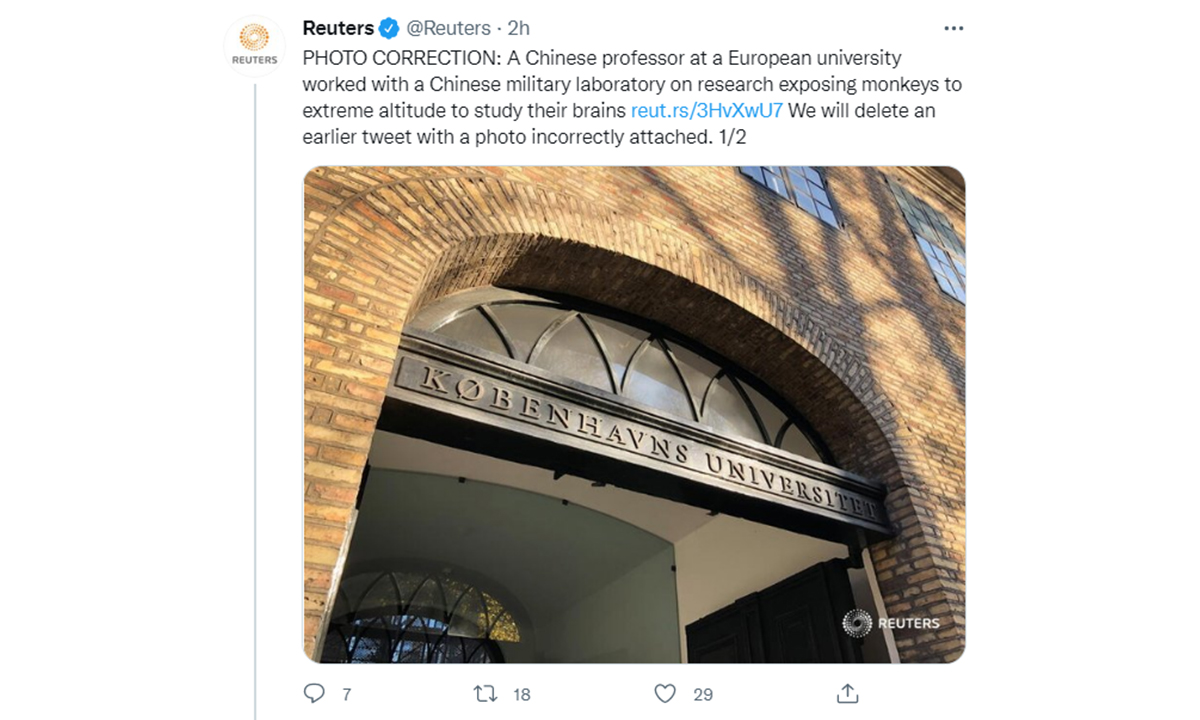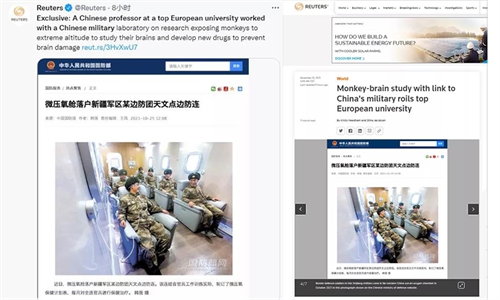Chinese professor accuses Reuters of “partially selecting answers” from University of Copenhagen to undermine his research

Photo: A screenshot of Reuters' Twitter account
The University of Copenhagen has no objection nor concern over a Chinese professor's genetic cooperation with Chinese military, the Chinese professor in case told the Global Times after Reuters launched a smear campaign against him and his research in an article. He also said that the University of Copenhagen has been aware of the fact that Reuters twisted the interview between them to throw mud at the Chinese professor.
The remarks was made by Zhang Guojie, a Chinese professor at the University of Copenhagen, after Reuters accused Zhang of intentionally hiding from the university in regard to his connection with the Chinese military when conducting genetic research on monkey brains at the Danish university. By hyping China's pursuit of biotechnology with a "military use," the Reuters report apparently tries to ignite anxiety among European universities over cooperation with Chinese researchers.
The research exposed monkeys to extreme altitudes to study their brains and aimed to develop new drugs to prevent brain damage.
In an email reply to the Global Times on Friday night, the professor said that contrary to the Reuters report, the university has had no objection or worries over his research that complies with university rules.
He said the university was aware that the report partially selected the answers from university staff and was made up based on the reporter's subjective thinking.
"This is just a normal basic research, and all the information is publicly available. Besides the research and its result, there is nothing worth paying attention to," Zhang told the Global Times in the email.
The University of Copenhagen hasn't replied to the Global Times as of press time.
According to the Reuters report, among all 14 agencies that have been involved in the experiment, there are 13 Chinese institutes, which include three military medical research institutes, as soldiers stationed in high altitude areas are also victims of altitude stress.
The strategy of Military-Civil Fusion (MCF) is not only prevalent in China, but also widely adopted in some Western countries. Yet many Western media outlets have launched torrents of attacks on China's MCF strategy.
These attacks were also included in the Reuters report, which said that concerns about China's MCF, and about universities transferring sensitive technology to China that could help its military, have grown in the US in recent years. Washington agreed last month to work with the EU on the issue under a new joint technology and trade council, Reuters said.
Kirsty Needham, the author of the Reuters article, has repeatedly attacked China's MCF strategy. An article she wrote in July this year accused China's genomics giant BGI Genomics Co of developing prenatal tests in collaboration with the military and of using them to collect genetic data from millions of pregnant women for research on population traits.
The accusation was denied by the company, and was slammed by China's Ministry of Foreign Affairs as "baseless accusation and smear."
"In order to suppress China's rising technological development, some Western countries, spearheaded by the US, are resorting to every means available to thwart China's development in these areas," Li Haidong, professor at the Institute of International Relations of the China Foreign Affairs University, told the Global Times on Saturday.
He said that, ironically, such biased view has crippled academic research in those Western countries as a result, as many Chinese researchers and scientists gave up opportunities in those countries, or been suppressed by those governments.
What is more, the Reuters tweeted its article about Chinese military laboratory on research exposing monkeys to extreme altitudes alongside a photo of Chinese PLA soldiers in an oxygen chamber which had nothing to do with the content of the tweet.
Reuters later changed the picture and published a photo correction.
The mistake has outraged Chinese netizens. Reuters has apologized to the Global Times via an email, saying that "A tweet on our account regrettably included a photo of Chinese soldiers in an oxygen chamber that was not correctly described. As soon as we became aware of our mistake, the tweet was deleted and corrected, and we apologize for the offense it caused."
Yet netizens aren't buying the "insincere apology."
"It is just a cheap apology, I did not read regret throughout those words at all," writes one Sina Weibo user. Many netizens are demanding Reuters issue a sincere and formal apology to Chinese people.

